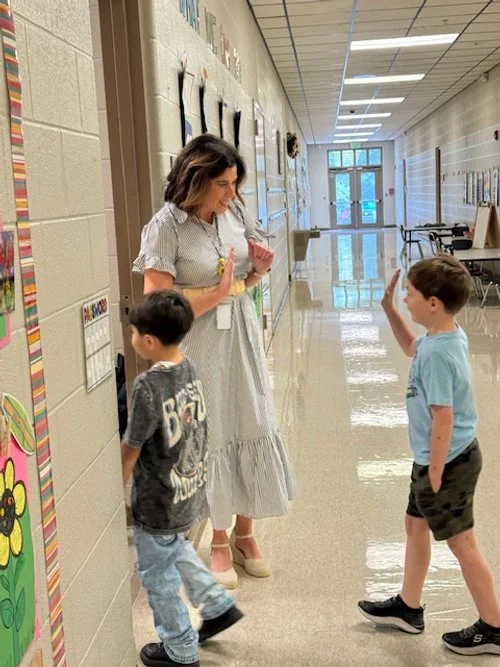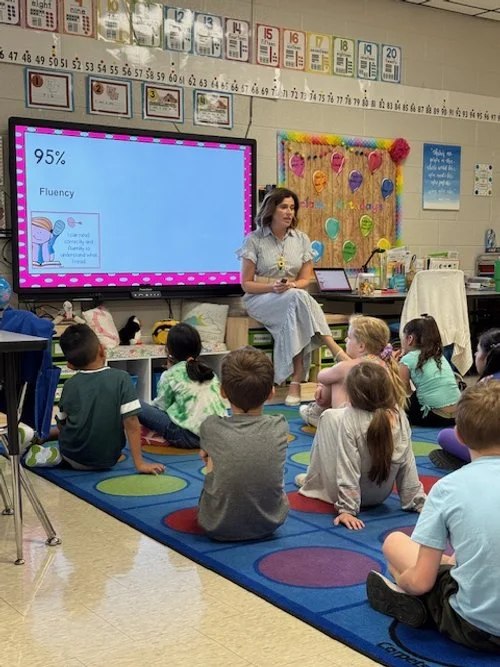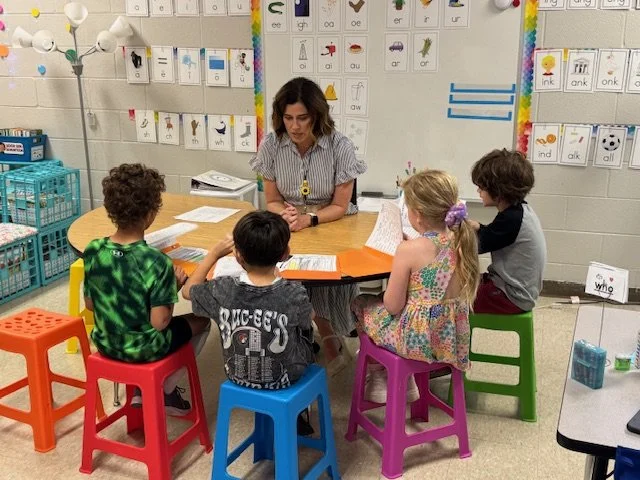Franklin Special School District Teacher of the Year Finalist Ginger Colvett Champions Literacy and Belonging for English Learners
For Ginger Colvett, becoming a teacher wasn’t a straight path, but it was always a calling.
As a child, she filled her days with babysitting, volunteering, and dreaming of her own classroom. But after earning a psychology degree, Colvett initially chose not to pursue her teaching license. It wasn’t until years later, after returning from a family trip to Guatemala and enrolling in Lipscomb University’s master’s program in education with a focus on English Learners (EL), that she fully stepped into the profession she’d always felt pulled toward.
Now, 11 years into her teaching journey, Colvett is a 2025–26 Tennessee Teacher of the Year finalist, representing Franklin Special School District, one of the smallest and most tightly connected districts in the state.
“It’s quite humbling,” she said. “There are so many excellent educators in Tennessee, and I’ve been mentored by some phenomenal ones. There’s a piece of them in this honor.”
Teaching for Opportunity, Not Excuses
Colvett teaches first grade in a school where 40–50 percent of students are English Learners at any given time. Her classroom is animated by constant movement, rhythm, and song, with learning broken into ten-minute bursts to keep pace with young, tech-savvy minds.
“Our school’s mission is ‘Learning for all, no exceptions,’” Colvett said. “I believe all students can learn, no matter where they (come) from or what challenges they face. I won’t make excuses. I build relationships so I can hold them to high expectations.”
That drive stems not only from her professional training but also from personal experience. During her time in Guatemala, Colvett experienced the frustration of language barriers firsthand—a revelation that shaped her understanding of what many of her students go through daily.
“When you’re learning a language and can’t communicate, it’s like being a toddler again—throwing fits just to be understood,” she said. “That stuck with me.”
Back in Tennessee, she began a Bible study group for mothers learning English and built a bridge of community and belonging. That sense of belonging remains a cornerstone of her teaching practice today.
Literacy as Liberation
To strengthen reading fluency—an area where her team noticed their students struggling—Colvett and her colleagues collaborated after a dyslexia training to launch a dedicated fluency team. They redesigned daily instruction to better integrate fluency-building strategies. The result? “Rates went through the roof,” Colvett said.
Her students also take ownership of their learning through an end-of-year “Wonder Bubble” project. Each child explores a curiosity-driven research question like, “Who invented calculus?” Students then present their findings to an audience, practicing expression, confidence, and inquiry-based learning.
Centering Culture and Connection
Culturally responsive teaching is more than a theory for Colvett; it’s a daily practice rooted in empathy, awareness, and affirmation. She takes time to learn each child’s background, acknowledging how culture, language, and even fatigue impact classroom behavior and performance.
Technology plays a meaningful role in her classroom, but never at the expense of human connection. Through iReady, her students receive personalized learning paths in reading and math, supported by Colvett’s in-person instruction, movement-based learning, and songs that energize each lesson.
A Lasting Legacy
Outside of the classroom, Colvett has contributed to her district’s broader success by serving as a mentor and advocate for instructional innovation, especially in early literacy. Her influence extends not only through curriculum improvements but through the mindset she models: compassion paired with accountability.
She hopes her students remember her not just as someone who taught them to read or solve math problems, but as someone who believed in their potential, even when the world didn’t always recognize it.
“Tennessee has some great things going on in education,” she said. “We’ve made real progress in preparing our kids for the future. My own three children went through Tennessee public schools, and when they got to college, they were more prepared than many students from other states. We need to keep building on that.”
As for advice to the next generation of teachers?
“Don’t let the shifting trends in education distract you,” Colvett said. “Remember your purpose: to provide something valuable to your students. Stay rooted in that, and you’ll always find your way.”




